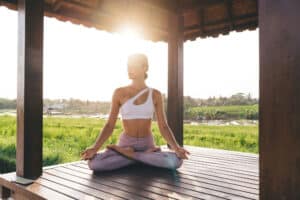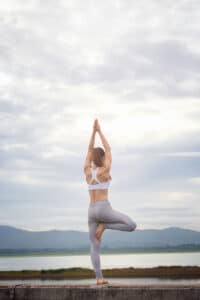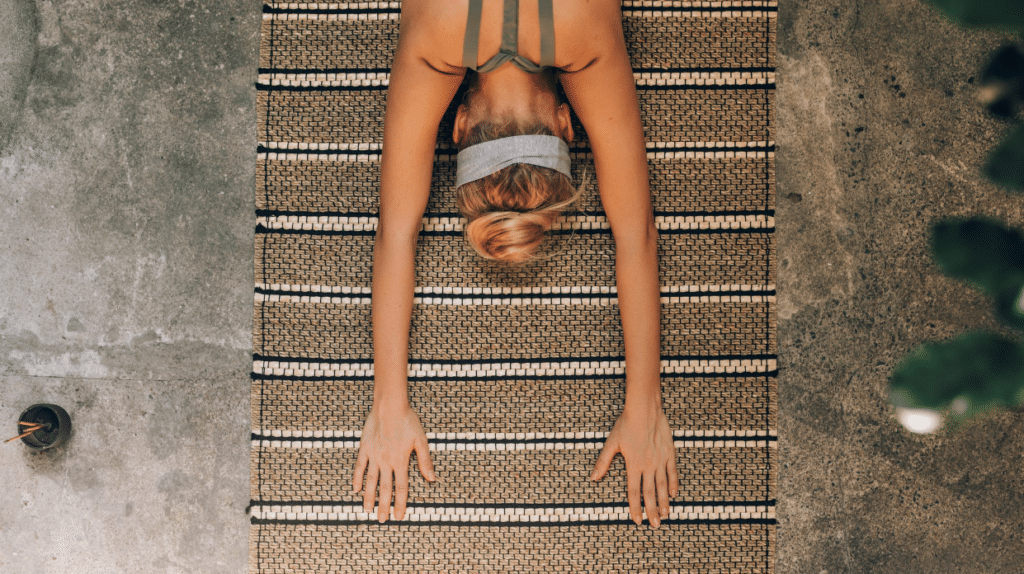Yoga Therapy Benefits During Recovery

A truly comprehensive path to treating mind, body, community, and spirit, yoga therapy has many positive effects and impacts when used during recovery. Substance abuse programs around the globe are including yoga therapies in recognition of the therapy’s beneficial role in bringing people back to wellness at multiple levels of their being. Villa Kali Ma’s founder, Kay White, founded Villa Kali Ma from her positive experiences of sobriety and many octaves of higher happiness through the effects of yoga.
One immediate area of improvement for people receiving yoga therapy as a part of their recovery or mental health treatment program relates to the ability to reset one’s state of being swiftly because of the effective tools for self-regulation and emotion modulation. Due to the primacy of the physical body in distress as well as happiness, the approach to self-balancing and harmonization helps enormously, as people learn how to be in charge of their inner states.
Women who enter treatment and/or seek help for emotional suffering have often either never experienced or long forgotten what it feels like to feel safe, ok, relaxed, and pleasantly alert in their inner bodies. Working within the inner level of being as a starting point is also shown to be one of the most effective paths for working with trauma, for the simple reason that trauma is rooted primarily in our nervous systems and brains.
What are the Life-Changing Tools Used in Yoga Therapy?
The life-changing tools used in yoga therapy, which include transformational breath work, detoxifying and energizing poses, balancing postures, mudras (hand poses, or sacred gestures), mantra (chants), and the deeply soothing practices of Yoga Nidra (deep yogic rest), are each excellent in a specific, targeted way for invoking states of peace, safety and deep wellbeing.
The tools not only get straight to the source of trauma and suffering to provide relief but deeply rewire and retrain the nervous system so that over time bodies can stabilize around happiness and well-being. Bodies that feel good, safe, and happy will not turn to substances nor be prone to the pain and suffering associated with the troubling minds of so many women of our time.
Increasingly, addiction treatment providers and mental health programs are learning the benefits of teaching clients to use the full approach to wellness for self-regulation and mental-emotional rebalancing. Villa Kali Ma’s holistic programs for mental health and addiction recovery are built around the core insights, methodologies, and worldview provided.
Overall, it enhances, supports, and underscores the goals of mental health and addiction recovery in several ways. Due to its emphasis on meditation, mindfulness, and self-soothing practices, it vastly enhances abilities relating to self-observation, inducing states of wise mind, also called neutral witness or compassionate observer. The curious, compassionate, but relaxed state of being able to watch one’s experience with loving detachment is key in any path to regaining self-control, re-empowerment, and moving on in life from one’s past troubles.
What Do Yoga Therapy Methods Help With?
Yoga therapy methods help with many daily life activities for people recovering from a life hurt by substance abuse or mental illness patterning, as well. The practices have been shown to assist in reducing drug cravings, neutralizing triggers, providing a healthy mindset and outlook, as well as assisting in preventing relapse. Further pros include better health and eating habits, better sleep, less stress, better energy levels, increased stamina, reduced fatigue, and an easier time tolerating times of difficulty. All in all, it is rich in resources for any woman seeking to recover from the difficulties that accompany addiction, trauma, and mental health struggles.
What to Expect from a Yoga Session
A session of yoga therapy will address aspects of the mind, body, and spirit. Yogic traditions see these three parts of the human experience as inseparable, with each impacting the other in complex ways. A given session may include elements of poses, personally tailored yoga recommendations, physical therapy, meditation, mantras, breath work, relaxation exercises, and/or mudras (hand gestures) all guided by a certified yoga therapist to improve mental and physical health through physical postures.
Since yoga therapy approaches health through a holistic lens, mental health professionals will help you see any physical ailments as also having mental, emotional, and spiritual aspects. Likewise, mental, emotional, and spiritual maladies will be treated as connected and intimately related to your physiology. Therapeutic yoga will be led by physical therapists to help with stress management and mental health problems. The therapeutic effects will be an important element of the treatment plan.
Unlike a yoga class, in which teachers guide students, the sessions work more fluidly and interactively, focusing specifically on you and your needs as they emerge in real-time, moment by moment. You can expect your Yoga Therapist to coach you directly on how to incorporate practices of yoga, like breathing, postures, meditation, and mindfulness techniques into your daily life requirements outside of your first session with a small group. Part of the work will be to generate a plan and approach to practicing yoga regularly on your own that will best target your needs and fit well into your life.
As you practice yoga in other forms, you will see the fruit of easing symptoms in your life. Yoga can reverse heart disease, heal multiple sclerosis, and improve symptoms of post-traumatic stress disorder. Before engaging in yoga, however, it’s best to speak to a healthcare provider first. Yoga experience is not required, and the yoga therapists will tailor the session to your current level of fitness and mobility. Overall you can expect the following to come to you:
- Boosted health, immunity, happiness, and wellbeing, including a more positive outlook on life
- Reduced fatigue and pain, more natural self-soothing and distress-tolerance capacity
- More regularity and consistency in mental-emotional health and balance
- Enhanced toolkit of on-the-spot coping methods for stressful times, like a yoga journal
- Better physical condition, balance, flexibility, and stamina
Yoga Instructors Offer Yoga at Villa Kali Ma in San Diego County

More and more, yoga therapy is offered around the globe in many kinds of settings, in recognition of positive outcomes associated as an assist in improving everything from physical health to community-wide problems.
You can also work with a Yoga Therapist in solo sessions by working with a practitioner in your community. Some Yoga Therapists offer online sessions, and there are also training centers and classes offering introductions to methods and practices.
Overall when working with yoga therapy you can expect to work with a qualified professional who will help you in the creation of a personalized practice that will allow you to experience the many rewards of this rich, ancient tradition of wellbeing of mind, body, and soul.
Villa Kali Ma offers yoga therapy as a central part of our holistic recovery programs for women recovering from trauma, addictions, and mental health struggles. There are many ways to check out how we have adapted and integrated these healing practices to work specifically with the contemporary forms of suffering experienced by women today.
If you choose to work with us in one of our many programs, you will experience powerful yoga therapy directly among our community of women. Join us today to get started on your journey to healing and recovery.






